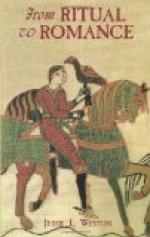Of late years there has been a growing tendency among scholars to seek in the Mysteries the clue which shall enable us to read aright the baffling riddle of the Grail, and there can be little doubt that, in so doing, we are on the right path. At the same time I am convinced that to seek that clue in those Mysteries which are at once the most famous, and the most familiar to the classical scholar, i.e., the Eleusinian, is a fatal mistake. There are, as we shall see, certain essential, and radical, differences between the Greek and the Christian religious conceptions which, affecting as they do the root conceptions of the two groups, render it quite impossible that any form of the Eleusinian Mystery cult could have given such results as we find in the Grail legend.[4]
Cumont in his Les Religions Orientales dans le Paganisme Romain, speaking of the influence of the Mysteries upon Christianity, remarks acutely, “Or, lorsqu’on parle de mystères on doit songer à I’Asie hellénisée, bien plus qu’à la Grèce propre, malgré tout le prestige qui entourait Eleusis, car d’abord les premières communautés Chrétiennes se font fondées, formées, développées, au milieu de populations Orientales, Sémites, Phrygiens, Egyptiens."[5]
This is perfectly true, but it was not only the influence of milieu, not only the fact that the ‘hellenized’ faiths were, as Cumont points out, more advanced, richer in ideas and sentiments, more pregnant, more poignant, than the more strictly ‘classic’ faiths, but they possessed, in common with Christianity, certain distinctive features lacking in these latter.
If we were asked to define the special characteristic of the central Christian rite, should we not state it as being a Sacred meal of Communion in which the worshipper, not merely symbolically, but actually, partakes of, and becomes one with, his God, receiving thereby the assurance of eternal life? (The Body of Our Lord Jesus Christ preserve thy body and soul unto everlasting life.)
But it is precisely this conception which is lacking in the Greek Mysteries, and that inevitably, as Rohde points out: “The Eleusinian Mysteries in common with all Greek religion, differentiated clearly between gods and men, eins ist der Menschen, ein andres der Götter-Geschlecht—en andron, en theon genos.” The attainment of union with the god, by way of ecstasy, as in other Mystery cults, is foreign to the Eleusinian idea. As Cumont puts it “The Greco-Roman deities rejoice in the perpetual calm and youth of Olympus, the Eastern deities die to live again."[6] In other words Greek religion lacks the Sacramental idea. [*** Note: Weston used Greek alphabetic characters above ***]
Thus even if we set aside the absence of a parallel between the ritual of the Greek Mysteries and the mise-en-scène of the Grail stories, Eleusis would be unable to offer us those essential elements which would have rendered possible a translation of the incidents of those stories into terms of high Christian symbolism. Yet we cannot refrain from the conclusion that there was something in the legend that not merely rendered possible, but actually invited, such a translation.




